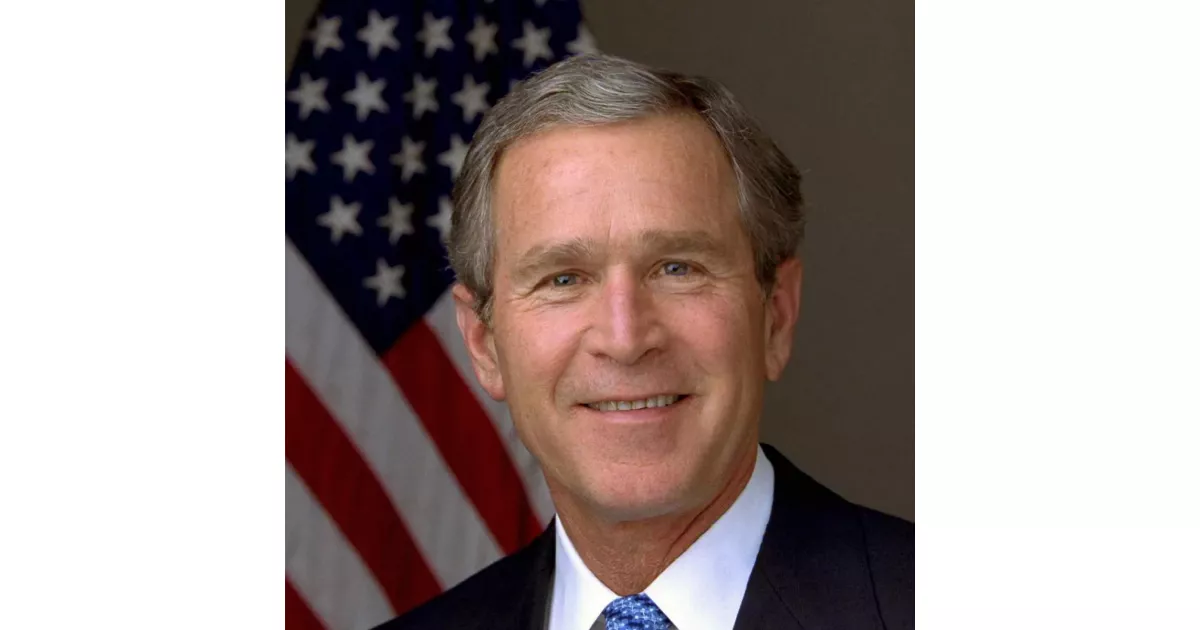A closer look at the biggest achievements of George W. Bush. Awards, milestones, and records that define success.
George W. Bush, the 43rd U.S. President (2001-2009), is a Republican politician, businessman, and former U.S. Air Force officer. The son of President George H.W. Bush, he previously served as the 46th Governor of Texas (1995-2000). His presidency was largely defined by the September 11th terrorist attacks in 2001, which led to the launch of the War on Terror, including military interventions in Afghanistan and Iraq. Domestically, he enacted education reform legislation known as No Child Left Behind and signed tax cuts into law. His administration also faced criticism for its handling of Hurricane Katrina and the 2008 financial crisis.
1998: Won Re-election as Governor
In 1998, George W. Bush won re-election as governor of Texas with a record 68 percent of the vote.
1998: Sale of Texas Rangers Shares
In 1998, George W. Bush's sale of his shares in the Texas Rangers brought him over $15 million from his initial investment.
2000: Won the Presidential Election
In 2000, George W. Bush won the presidential election against Al Gore, despite losing the popular vote and a Supreme Court decision halting a recount in Florida.
2000: Time names Bush Person of the Year
In 2000, Time magazine named George W. Bush as its Person of the Year, a title awarded to someone who the editors believe "has done the most to influence the events of the year".
2002: No Child Left Behind Act Signed into Law
In early 2002, George W. Bush signed the No Child Left Behind Act into law, which aimed to measure and close the gap between rich and poor student performance, provide options to parents with students in low-performing schools, and target more federal funding to low-income schools.
March 20, 2003: Invasion of Iraq
On March 20, 2003, the United States, along with the "coalition of the willing", initiated the invasion of Iraq. The Iraqi military was quickly defeated.
April 9, 2003: Fall of Baghdad
On April 9, 2003, Baghdad, the capital of Iraq, fell to U.S. forces during the invasion of Iraq.
May 2004: High approval rating among Republicans
In May 2004, a Gallup poll indicated that 89 percent of the Republican electorate approved of George W. Bush.
2004: Bush Re-elected as President
In 2004, George W. Bush was re-elected as president, defeating John Kerry.
January 2005: Iraqi Elections
In January 2005, Iraq held elections recognized by the West as free and fair for the first time in 50 years, leading to the election of Jalal Talabani as president and Nouri al-Maliki as Prime Minister of Iraq.
October 2005: Referendum on Iraqi Constitution
In October 2005, a referendum was held in Iraq to approve a new constitution, supported by most Shiites and many Kurds.
December 2005: Bush's highest approval rating since December 2005
In December 2005, George W. Bush had achieved his highest approval rating since then, according to polls conducted in April 2013
May 7, 2007: North Korea Agrees to Shut Down Nuclear Reactors
On May 7, 2007, North Korea agreed to shut down its nuclear reactors immediately pending the release of frozen funds held in a foreign bank account, a result of three-way talks initiated by the United States and China.
June 2007: Street in Tirana, Albania, renamed after Bush
In June 2007, a street in Tirana, Albania, was renamed after George W. Bush a few days before his visit, marking the first visit by an American president to Albania.
July 2007: Unemployment Rate in July 2007
In July 2007, the unemployment rate dropped to 4.5%.
September 2, 2007: North Korea Agrees to Dismantle Nuclear Programs
On September 2, 2007, North Korea agreed to disclose and dismantle all its nuclear programs by the end of 2007.
October 2007: Peak of Dow Jones Average
In October 2007, the Dow Jones Industrial Average peaked at over 14,000 during George W. Bush's presidency.
March 2008: Praise for Iraqi Government's Action
In March 2008, President Bush praised the Iraqi government's "bold decision" to launch the Battle of Basra against the Mahdi Army, calling it "a defining moment in the history of a free Iraq".
May 21, 2008: Signing of Genetic Information Nondiscrimination Act
On May 21, 2008, George W. Bush signed into law the Genetic Information Nondiscrimination Act, which protects Americans against health insurance and employment discrimination based on genetic information.
July 2008: Withdrawal of American Forces
By July 2008, due to increased stability in Iraq and lowered American troop deaths, President Bush withdrew additional American forces from the country.
January 2009: Bush's favorability rating stands at 40 percent
In January 2009, George W. Bush's favorability rating in public opinion surveys stood at 40 percent.
March 2009: Bush's favorability rating decreases to 35 percent
In March 2009, George W. Bush's favorability rating decreased to 35 percent.
2009: C-SPAN's 2009 survey of historians ranked Bush as the 36th-best president
In 2009 C-SPAN's survey of historians ranked George W. Bush as the 36th-best president.
July 2010: Bush's favorability rating rises to 45 percent
In July 2010, George W. Bush's favorability rating rose to 45 percent.
2010: Siena Research Institute survey ranks Bush 39th out of 43 presidents
In 2010, a Siena Research Institute survey of historians, political scientists, and presidential scholars ranked George W. Bush 39th out of 43 presidents, giving him low ratings on various aspects of his presidency.
February 2012: Gallup reports Americans still rate Bush among the worst presidents
In February 2012, Gallup reported that Americans still rated George W. Bush among the worst presidents, although their views had become more positive since he left office.
2012: Bush receives Order of the Cross of Terra Mariana
In 2012, Estonian president Toomas Hendrik Ilves awarded George W. Bush the Order of the Cross of Terra Mariana for his work in expanding NATO.
April 2013: Bush's approval rating reaches 47 percent
In April 2013, George W. Bush's approval rating stood at 47 percent approval and 50 percent disapproval in a poll jointly conducted for The Washington Post and ABC, his highest approval rating since December 2005.
June 2013: Bush's ratings become more positive than negative
In June 2013, George W. Bush's ratings became more positive than negative for the first time recorded by Gallup, with 49 percent viewing him favorably compared to 46 percent unfavorably.
2013: PEPFAR saves five million lives
By 2013, The U.S. government had spent $44 billion on PEPFAR, and it was estimated that the initiative had saved five million lives since 2003. Peter Baker of The New York Times noted that "Bush did more to stop AIDS and more to help Africa than any president before or since."
2015: CNN poll finds an increase of nine points in favorability of Bush
A 2018 CNN poll showed that favorability of George W. Bush had increased nine points from 2015.
2017: Bush's public image improves, with 51 percent favorability from Democrats
In 2017, George W. Bush's public image saw greater improvement, with a YouGov survey showing 51 percent of favorability from Democrats.
2018: CNN poll finds 61 percent of respondents hold a favorable view of Bush
In 2018, a CNN poll found that 61 percent of respondents held a favorable view of George W. Bush, an increase of nine points from 2015.
2021: C-SPAN's 2021 survey of historians ranked Bush as the 29th-best president
In 2021 C-SPAN's survey of historians ranked George W. Bush as the 29th-best president, improving from 36th in 2009.
2023: PEPFAR estimated to have saved over 25 million lives
By 2023, PEPFAR was estimated to have saved over 25 million lives, alleviating the severity of the HIV/AIDS epidemic especially in Sub-Saharan Africa, and was called "George W. Bush's greatest accomplishment" by Vox.
Mentioned in this timeline

Donald John Trump is an American politician media personality and...

Michelle Obama an American attorney and author served as the...

Barack Obama the th U S President - was the...

Bill Clinton the nd U S President - served as...
Ukraine is a country in Eastern Europe the second-largest on...

Joe Biden is an American politician who served as the...
Trending

3 months ago Michelle Obama: America 'not ready' for a woman president, cites sexism concerns.

1 hour ago Apple MacBook Pro: Touchscreen, Dynamic Island, and New Interface Coming Soon.

14 minutes ago Ethereum Price Faces Resistance at $1,950 Amidst Market Repricing Concerns.
14 minutes ago BP Receives Hold Ratings Amid Strategy Updates and Increased Rating by Argus.
1 hour ago Whitefox & Fluid Quip collaborate; Low-carbon ethanol boosted; Indoor plants aid climate resilience.
1 hour ago HSBC: Enterprise Software Strong, AI Enhances Capabilities, Valuations Historically Low.
Popular

Jesse Jackson is an American civil rights activist politician and...

Susan Rice is an American diplomat and public official prominent...

Barack Obama the th U S President - was the...

Michael Joseph Jackson the King of Pop was a highly...

XXXTentacion born Jahseh Dwayne Ricardo Onfroy was a controversial yet...

Bernie Sanders is a prominent American politician currently serving as...
